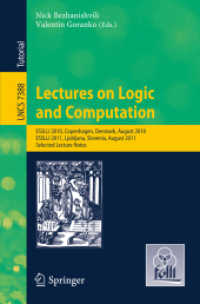- ホーム
- > 洋書
- > 英文書
- > Nature / Ecology
Full Description
This book comprehensively utilizes the new generation of artificial intelligence and remote sensing science and technology to systematically carry out researches on high-precision recognition, monitoring, analysis, and assessment of geological disasters by using different technologies of "ground, airspace, and space-based systems" and different scales of "target-semantic-region". The main contents include:
1) Intelligent interpretation theory and methods of geological disasters,
2) Intelligent analysis of landslide based on long-term ground monitoring data,
3) Intelligent analysis of landslide evolution based on optical satellite remote sensing data,
4) Deep learning-based remote sensing detection of landslide,
5) Intelligent assessment methods of landslide susceptibility,
6) Intelligent recognition of ground figure based on airspace-based remote sensing data.
The book is of interest to graduate student, scientific, and technological personnel who work in the area of geological disasters, natural hazards, remote sensing, and artificial intelligence.
Contents
Chapter 1. Geological disaster: An overview.- Chapter 2. Research methods of geological disasters.- Chapter 3. Principles and methods of intelligent interpretation of geological disasters.- Chapter 4. Intelligent analysis of multi-source long-term landslide ground monitoring data.- Chapter 5. Intelligent monitoring of landslides based on high-resolution optical remote sensing data.- Chapter 6. Deep learning-based remote sensing monitoring of landslide.- Chapter 7. Deep learning-based landslide susceptibility assessment.- Chapter 8. Deep learning-based intelligent recognition of ground fissures.- Chapter 9. Machine learning-based remote sensing monitoring of land subsidence in mining areas.- Chapter 10. Concluding remarks.






